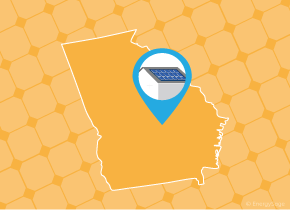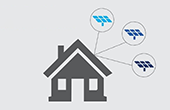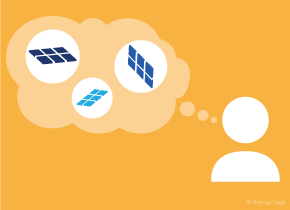History of solar policy in Georgia
Georgia typically ranks on the edge of the top ten in the SEIA national rankings, having installed over 1,500 megawatts (MW) of solar capacity throughout the state as of early 2019. Unlike other leading solar states, who primarily rely on strong solar incentives for growing the industry, Georgia has focused on a more market driven approach to building the industry, leaning on low-cost utility-scale solar farms.
Nevertheless, the first solar-related policy issued by Georgia can be traced back to the early stages of the solar industry. In 1978, the state’s General Assembly found it necessary to consider alternative energy sources in the wake of the oil crisis, and passed the the Solar Easements Act of 1978, which gave solar owners assurance of continued access to sunlight for their systems. While not a financially based incentive for residents, this policy was important in demonstrating the state’s intent for solar.
However, it was not until 2001 that additional solar policies were passed in-state. The Cogeneration and Distribution Act of 2001 quickly became very important to the Peach State’s solar industry, as it created a net metering program for residents to be able to sell net excess generation from their solar energy systems back to utilities in order to decrease their energy bill. Net metering is a crucial policy for compensating homeowners for installing independent energy systems and is a fixture in almost every leading solar state. While Georgia’s net metering doesn’t provide all of the benefits afforded by similar policies in leading solar states, it is still paramount to the success of the state’s solar industry.
Aside from net metering, Georgia has seen few other rebates and incentives for residents to go solar. In 2008, legislation established personal tax credits of 35 percent of the cost of renewable energy systems (including installation). However, the funds for the tax credit program ran out in 2014, much to the dismay of clean energy advocates. The majority of solar rebates offered today are through local utilities such as Central Georgia EMC, Greystone Power, and Jackson EMC, which have a small customer base. The largest utility in state, Georgia Power, is participating in solar buyback programs, though applicants have experienced long waiting periods as the utility awaits more capacity and investment.
The state approved Georgia Power’s 2016 Integrated Resource Plan (IRP), which called for increasing their renewable energy portfolio by 1,200 MW through its Renewable Energy Development Initiative (REDI). Additionally, as solar has become more affordable, Georgia has started to encourage rooftop or smaller-scale distributed solar through the Solar Power Free Market Financing Act of 2015. This regulation establishes that power purchase agreements (PPAs) are a lawful way to finance the construction and operation of a solar electric generation system, which will continue to make solar more attractive for everyone involved in the market.
While solar policy in Georgia has been sparse, many electric utilities have come up with favorable clean energy plans to encourage the growth of the industry so far. Given the city of Atlanta’s pledge to be 100 percent renewable by the year 2035, it looks like the industry will continue to grow in Georgia for years to come.












